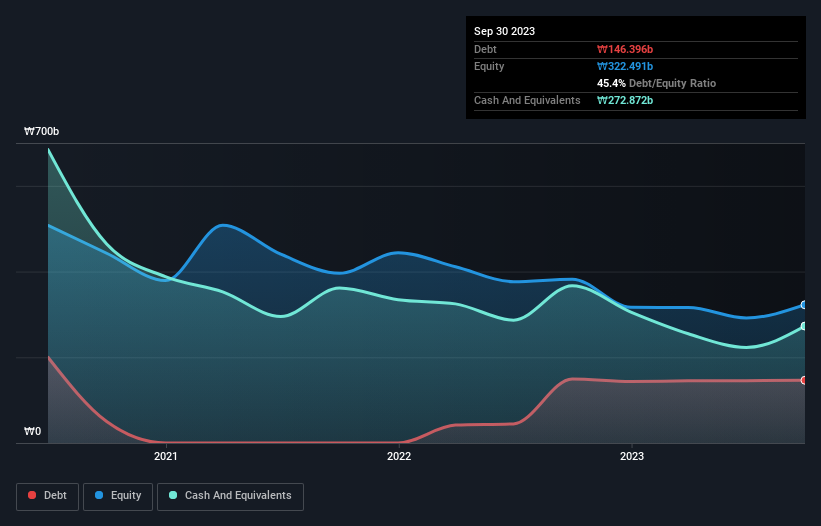
Some say volatility, rather than debt, is the best way to think about risk as an investor, but Warren Buffett famously said that 'Volatility is far from synonymous with risk.' It's only natural to consider a company's balance sheet when you examine how risky it is, since debt is often involved when a business collapses. We can see that SK Biopharmaceuticals Co., Ltd. (KRX:326030) does use debt in its business. But is this debt a concern to shareholders?
When Is Debt A Problem?
Generally speaking, debt only becomes a real problem when a company can't easily pay it off, either by raising capital or with its own cash flow. In the worst case scenario, a company can go bankrupt if it cannot pay its creditors. However, a more usual (but still expensive) situation is where a company must dilute shareholders at a cheap share price simply to get debt under control. Of course, the upside of debt is that it often represents cheap capital, especially when it replaces dilution in a company with the ability to reinvest at high rates of return. When we think about a company's use of debt, we first look at cash and debt together.
See our latest analysis for SK Biopharmaceuticals
What Is SK Biopharmaceuticals's Debt?
The chart below, which you can click on for greater detail, shows that SK Biopharmaceuticals had ₩146.4b in debt in September 2023; about the same as the year before. However, it does have ₩272.9b in cash offsetting this, leading to net cash of ₩126.5b.

How Healthy Is SK Biopharmaceuticals' Balance Sheet?
The latest balance sheet data shows that SK Biopharmaceuticals had liabilities of ₩254.4b due within a year, and liabilities of ₩174.1b falling due after that. Offsetting this, it had ₩272.9b in cash and ₩94.5b in receivables that were due within 12 months. So its liabilities outweigh the sum of its cash and (near-term) receivables by ₩61.2b.
This state of affairs indicates that SK Biopharmaceuticals' balance sheet looks quite solid, as its total liabilities are just about equal to its liquid assets. So it's very unlikely that the ₩7.29t company is short on cash, but still worth keeping an eye on the balance sheet. While it does have liabilities worth noting, SK Biopharmaceuticals also has more cash than debt, so we're pretty confident it can manage its debt safely. There's no doubt that we learn most about debt from the balance sheet. But it is future earnings, more than anything, that will determine SK Biopharmaceuticals's ability to maintain a healthy balance sheet going forward. So if you're focused on the future you can check out this free report showing analyst profit forecasts.
Over 12 months, SK Biopharmaceuticals made a loss at the EBIT level, and saw its revenue drop to ₩291b, which is a fall of 30%. To be frank that doesn't bode well.
So How Risky Is SK Biopharmaceuticals?
We have no doubt that loss making companies are, in general, riskier than profitable ones. And the fact is that over the last twelve months SK Biopharmaceuticals lost money at the earnings before interest and tax (EBIT) line. Indeed, in that time it burnt through ₩125b of cash and made a loss of ₩84b. But at least it has ₩126.5b on the balance sheet to spend on growth, near-term. Overall, we'd say the stock is a bit risky, and we're usually very cautious until we see positive free cash flow. When we look at a riskier company, we like to check how their profits (or losses) are trending over time. Today, we're providing readers this interactive graph showing how SK Biopharmaceuticals's profit, revenue, and operating cashflow have changed over the last few years.
Of course, if you're the type of investor who prefers buying stocks without the burden of debt, then don't hesitate to discover our exclusive list of net cash growth stocks, today.
New: Manage All Your Stock Portfolios in One Place
We've created the ultimate portfolio companion for stock investors, and it's free.
• Connect an unlimited number of Portfolios and see your total in one currency
• Be alerted to new Warning Signs or Risks via email or mobile
• Track the Fair Value of your stocks
Have feedback on this article? Concerned about the content? Get in touch with us directly. Alternatively, email editorial-team (at) simplywallst.com.
This article by Simply Wall St is general in nature. We provide commentary based on historical data and analyst forecasts only using an unbiased methodology and our articles are not intended to be financial advice. It does not constitute a recommendation to buy or sell any stock, and does not take account of your objectives, or your financial situation. We aim to bring you long-term focused analysis driven by fundamental data. Note that our analysis may not factor in the latest price-sensitive company announcements or qualitative material. Simply Wall St has no position in any stocks mentioned.
About KOSE:A326030
SK Biopharmaceuticals
A pharmaceutical company, engages in the research and development of drugs for the treatment of central nervous system disorders.
Exceptional growth potential with excellent balance sheet.
Market Insights
Community Narratives



